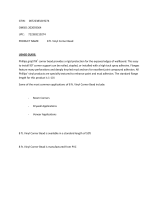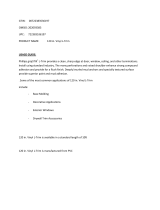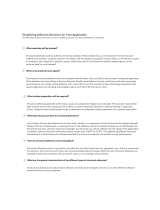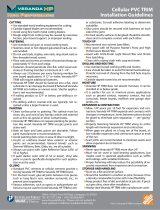
KLEER
®
LUMBER Inc.
INSTALLATION GUIDELINES
®
INSTALLATION
KLEER ONE-PIECE CORNERBOARDS
• Kleer one-piece cornerboards and Kleer Konceal one-
piece cornerboards offer reduced installation time and
improved finished appearance opportunities.
• All corner sheathing must be properly flashed prior to
installing all Kleer cornerboards.
• Make sure the cornerboard is properly positioned prior
to fastening. Take special care to leave appropriate
expansion and contraction spacing at both the top and
bottom of the cornerboard.
• Standard 3 ½" and 5 ½" wide (per side) cornerboards
require two fasteners evenly spaced across each side
spaced no more than 16" apart along its length. Custom
sizes larger than 8" wide (per side) require three
fasteners across each side spaced no more than 16"
apart along its length.
MOULDINGS
• Mouldings may be cut using standard woodworking
equipment. For power miter saws, carbide tooth blades
are recommended.
• Joints may be glued using products like Kleer Cellular
PVC Cement or Kleer Cellular PVC Adhesives. When
bonded correctly, the joint becomes an integral part of
the system being applied.
• Use Kleer Structural Sealant with mechanical fasteners
to improve holding power and make the installed
moulding more secure.
• Install Kleer mouldings using 6d and 8d galvanized or
stainless steel nails 12" on-center and approximately ¾"
from each edge.
• Pre-punch moulding for easier hand nailing and use a
nail set to countersink nail heads. If nailing Kleer
mouldings at 40˚ F or below, pre-drilling is required.
These installation guidelines are only suggested techniques to be used when installing Kleer PVC products under typical
conditions. Kleer does not represent or warrant that these techniques will work in all applications. Kleer Lumber, Inc. assumes
no liability for any damages, including but not limited to, damages to the person, property, incidental, special and/or conse-
quential damages, whether or not foreseeable, resulting from, and/or relating to the installation of our products. Please refer
to Kleer's Limited Lifetime Warranty for more details concerning our exclusive and sole warranty.
To help maximize the beauty and performance of Kleer trimboards, please consider the
following installation reminders:
• Whenever possible install Kleer over a continuous substrate.
• Use the proper quantity and size of fasteners, applied in an even pattern so they will
penetrate into the substrate at least 1-1/2".
• Leave the appropriate expansion spaces between pieces of Kleer based on the temperature at
the time of installation.
• Use adhesives made for PVC products, like Kleer Cellular PVC Cement or Kleer Cellular
PVC Adhesives to join pieces of Kleer.
• Use 100% acrylic latex house paint to finish Kleer if you choose a color with an LRV greater
than or equal to 55%.
• Use a coating that is formulated specifically for exterior vinyl products if you choose a color
with an LRV less than 55%.
• Use Kleer Structural Sealant to fill expansion gaps and nail and screw holes.
KEY REMINDERS
©2014 Tapco International Corporation K2193 02/14
866.553.3770
•
KleerLumber.com

TIGHT TIGHT
1/16" 1/8" 1/16"
>1/16" >1/8" >1/16"
90°
50°
Below 50°
TIGHT
APPLY ADHESIVE
APPLY ADHESIVE
16"ON CENTER
8"
16" ON CENTER
2" MAX 2" MAX
2" MAX 2" MAX
• Kleer trimboards 8" or narrower require two fasteners
evenly spaced across the face of the board and
fastened to 1-1/2" thick framing no more than 16"
on-center. 10" and 12" Kleer trimboards require three
fasteners evenly spaced across the face of the board
and fastened to 1-1/2" thick framing no more than 16"
on-center. When spanning framing greater than 16"
on-center, use Kleer that is a minimum 5/4" (nominal)
thickness. Never install Kleer on framing that spans
greater than 24" on-center.
• When joining Kleer end to end (as in long-run
applications) fasten within one inch of both sides of the
joint using the proper size fasteners.
• Kleer sheets 3/4" thick or greater require fastening every
four inches along no more than 16" on-center framing
across the width of the sheet. Thinner sheets require
fastening every four inches along no more than 12"
on-center framing across the width of the sheet.
• Use of construction adhesive (along with mechanical
fastening) may help to minimize expansion and
contraction, particularly when Kleer is painted dark
colors (LRV greater than 55% – see PAINTING section).
GLUING
• Kleer can be both edge and face glued. Before gluing,
make sure surfaces are clean, dry and smooth enough
to make full contact.
• To prevent separation, joints may be glued using Kleer
Cellular PVC Cement or Kleer Cellular PVC Adhesives.
These adhesives have limited working time. Clamping,
nailing or screwing both sides of the joint will allow
time for the adhesive to fully cure. When joining two
pieces of Kleer together to form a continuous length,
fasten within one inch of each side of the joint using the
proper fasteners.
• When face gluing Kleer to Kleer (lamination) using Kleer
Cellular PVC Cement, lightly sand each face to ensure
proper adhesion. When face gluing Kleer to Kleer (lamina-
tion) when using Kleer Laminating Grade Adhesive, DO
NOT SAND THE FACES PRIOR TO LAMINATING.
• Kleer can also be laminated to a variety of substrates
using glues appropriate for both PVC and the substrate.
Consult with the adhesive manufacturer and always test
the bond prior to installation. Never use adhesives
alone to attach Kleer to a substrate.
HEAT BENDING
• Gradually heating Kleer to approximately 270˚ for 7
minutes with convection ovens, heat blankets and box
heaters will make it pliable enough to be formed into
various shapes. Gradual heating prevents damage such
as discoloration or scorching of the surface.
• To avoid skin burns, always wear protective gloves
thick enough to protect hands from the heated material.
PAINTING
• Kleer does not need paint to retain its Limited
Lifetime Warranty, but may be painted with 100%
acrylic latex paint or other paints specifically
formulated for vinyl products. Always follow the
paint manufacturer's instructions.
• Light Reflective Value (LRV) is a measurement of how
much light a color reflects and absorbs and is available
from the paint manufacturer. If Kleer is painted a darker
color with an LRV less than 55%, it will absorb more
light, generating more heat and may cause expansion
and contraction greater than the typical 1/8" over 18'.
When using 100% acrylic latex paints, only use colors
with an LRV greater than 55%. When using a color with
an LRV below 55%, use only paints specifically
designed for vinyl products like Sherwin-Williams
®
with
Vinyl Safe Technology or Benjamin Moore
®
Vinyl Select
paints. Consult with the paint manufacturer to
determine its suitability for your specific application.
Excessive expansion or contraction resulting from the
use of a dark color with an LRV less than 55% is not
covered by the Kleer Limited Lifetime Warranty.
• Kleer must be clean, dry and free from debris or
any surface contaminants to maximize paint
adhesion. Use a soft brush and standard household
cleaner if necessary to clean the surface before
painting. Stubborn stains may be removed with
denatured alcohol.
• For small surface imperfections including nail or screw
holes, Kleer Structural Sealant may be used as filler.
• It may take longer for paint to fully cure on Kleer than
on wood. Once fully cured paint lasts longer on Kleer
than wood.
KLEER BEADED PRODUCTS
• In soffit and porch ceiling applications, Kleer 1" Edge &
Center Bead can be installed perpendicular to 24"
on-center, or less, framing without a substrate.
KLEERLok and KLEERbeed should be installed
perpendicular to 12" on-center, or less, framing. All
framing members should be a minimum 1-1/2" thick.
• For concealed fastening, Kleer 1" Edge & Center
Bead should be fastened at each framing member
(24" on-center maximum) by toe-nailing through the
tongue with finish nails, or face-fastened using Cortex
Fasteners for Kleer PVC Trim.
• KLEERLok products feature a nailing flange for easier
concealed fastening. Fasten KLEERLok through the
nailing flange every 12" at each framing member using
siding or finish nails. Additional face-fastening and/or the
use of construction adhesive is required to help restrict
expansion and contraction in runs longer than 16'.
• KLEERBeed should be face-fastened every 4" along a
minimum of 12" on-center. Nail holes may be filled with
Kleer Nail Stick (if product is being painted), Kleer
Structural Sealant or Kleer Cellular PVC Time Adhesive
4-7 Minute Work.
• If installing Kleer Beaded Products in temperatures
below 50˚, leave a ¼" – ½" expansion space at each end
of the run and cover the space with Kleer Mouldings.
GENERAL
• Kleer is a highly versatile product for many exterior and
interior trim and decorative applications.
• Kleer should never be used for structural or load-
bearing applications.
STORAGE & HANDLING
• Kleer is more flexible than wood. When possible, Kleer
should be stored on a flat, level surface and handled
with extra care to avoid damage.
• Kleer is shipped from the manufacturing plant in either
KleerPak plastic wrap or woven covers to protect it from
dirt and debris until installed. If dirty, clean with a soft
brush and mild household cleaner. Stubborn stains may
be removed with denatured alcohol.
CUTTING & DRILLING & MILLING
• Kleer can be cut, drilled and milled using the same tools
used with wood.
• When cutting or milling, use carbide-tipped bits or blades
for best results. Special care should be used with jig/band
saws as they may create excessive heat and melt the PVC
along the edge. Failure to support Kleer across the entire
cut length or the use of dull blades to cut Kleer can result
in a rough edge. If this happens, sand with 150-220 grit
sandpaper to create a smooth edge.
• When drilling, frequently remove excess shavings to
avoid heat buildup.
EXPANSION & CONTRACTION
• Like many building materials, Kleer will expand and
contract with changes in temperature. This is normal and
is not covered by the Kleer Limited Lifetime Warranty.
Under normal conditions and when properly fastened,
Kleer will expand/contract approximately 1/8" per 18'.
Failure to use the proper type and quantity of fasteners
may result in expansion and contraction greater than
1/8" per 18'.
• Kleer trimboards should be acclimated to the
temperature conditions at the time of installation.
• Fastening Kleer along its entire length will help
minimize expansion and contraction.
• When joining Kleer end-to-end (as in long-run
applications) pieces may be joined together using
scarf joints and Kleer Cellular PVC Cement or Kleer
Cellular PVC Adhesive. If joints are glued together,
create 1/16" expansion spaces per 18' of run at each end.
These expansion spaces should be filled using Kleer
Structural Sealant.
• Alternatively, rather than gluing pieces together for long
runs, leave expansion spaces of approximately 1/8"
between the pieces and fill with Kleer Structural Sealant.
Use scarf joints for all expansion spaces between the
pieces in long runs and leave a 1/16" space per 18' of run
at each end.
• On cold days (temperatures at low end of the normal
annual temperature range), increase expansion space
between boards to slightly more than 1/8" per 18'
length.
• On hot days (temperatures at high end of the annual
temperature range), eliminate the expansion space
and butt the pieces together tightly.
FASTENING
• Fasten with stainless steel or hot-dipped galvanized nails
with blunt tips and round heads (wood siding nails, box
nails, etc.). Exterior coated or stainless steel trim-head
screws (nothing smaller than a #6 screw) and Cortex
®
Fasteners may also be used.
• Do not use staples, wire nails, or brads to fasten Kleer.
Fasteners that can be easily bent with bare hands will
not provide appropriate strength.
• Standard pneumatic nailers, set at 70-80 psi, may be
used to fasten Kleer. Air pressure may be adjusted as
necessary.
• Pre-drilling is not typically required unless using large
nails or installing in temperatures below 40˚.
• Fasten Kleer to a flat, solid wood substrate at least
1-1/2" thick using nails or screws that penetrate into the
substrate a minimum of 1-1/2".
• Kleer must have fasteners no more than 2" from each edge.
-
 1
1
-
 2
2
Ask a question and I''ll find the answer in the document
Finding information in a document is now easier with AI
Related papers
Other documents
-
 Phillips Manufacturing Company CBRVYLUPC8 Installation guide
Phillips Manufacturing Company CBRVYLUPC8 Installation guide
-
Builders Edge 050010108009 Operating instructions
-
 Phillips LT5VYLUPC10 Operating instructions
Phillips LT5VYLUPC10 Operating instructions
-
Ekena Millwork MLDFWM988X144 Installation guide
-
Grayne 2546028 Installation guide
-
Ekena Millwork WALP16X16CRV User manual
-
 GBTRICON SG_B074DV1YRL_US User guide
GBTRICON SG_B074DV1YRL_US User guide
-
Flex Trim 90067 Installation guide
-
 Inteplast IN5416425 Installation guide
Inteplast IN5416425 Installation guide
-
Veranda HP H190TWS2 Installation guide





